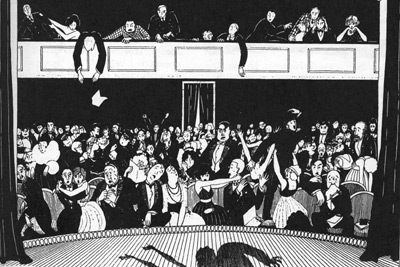An irate balletomane wrote in to complain. Will the ill-mannered Kennedy Center patrons in question have the grace to apologize to her?
Last Friday night at the Kennedy Center in Washington DC, American Ballet Theater’s Sleeping Beauty was a beautiful affair. Only a week before, a snow storm of historic proportions hit the DC area and, after dealing with a massive amount of snow and the busy week which ensued, I was very excited about attending the performance. What better way to spend a Friday night than lost in the Sleeping Beauty world, led by a superb cast – among them Gillian Murphy (Princess Aurora), Cory Stearns (Prince Desiré), Stella Abrera (the Lilac Fairy), and Misty Copeland (Princess Florine)?

Gillian Murphy (Aurora) in Alexei Ratmansky’s THE SLEEPING BEAUTY for American Ballet Theatre (Photo: Gene Schiavone)
In addition to outstanding dancing by some of the world’s greatest dancers, dreamy background and gorgeous costumes, the mime sequences in particular were truly captivating – revealing this amazing story in unusual detail.
Unfortunately, my enjoyment was dashed – not by the production or the performances, but by fellow patrons. Next to me (in Row V 125 in the Orchestra) sat a mother and her teenage son. Handsomely dressed in a white shirt and bow tie, he spoke knowledgeably about ballet and ballet dancers – which I initially perceived as a good sign. Once the performance started, however, the son revealed himself to be a talker. He had to give his observations and opinions about a great many things happening on stage. During the Hunt scene, for example, he blurted out “The women’s costumes look 19th century!”
It only got worse once Misty Copeland appeared on stage in Act III. Everyone in the audience, and no doubt on stage, heard the mother screeching; quite a few heads turned. The son continued to chatter and giggle. I am a big fan of Misty Copeland myself and share their admiration of her, but I seriously wondered how this kind of behavior affects the ability of the dancers onstage to focus on the incredibly challenging tasks at hand.

Misty Copeland (Princess Florine) and Gabe Stone Shayer (Bluebird) in Alexei Ratmansky’s THE SLEEPING BEAUTY (Photo: Doug Gifford)
The mother and son were also there to support a friend who was part of the local cast – a group of children, who incidentally did a wonderful job. I am all for supporting your friends and fellow dancers, and love to see an audience truly engaged in a performance. There is, however, a theatre-going etiquette that I would have thought is known to all students and lovers of ballet – which this mother and son clearly were. It is not optional, but a sign of respect for these accomplished artists who give their all on stage to entertain us, and a basic courtesy to those around you. The distraction created by this rude pair ruined the evening for me, and no doubt for many around them.








People who don’t go to the theater a lot may simply not know what standards of behavior are. But if they are sensitive to the reactions of people around them, they figure things out quickly enough. A ballet student and his mother on the other hand should know what’s expected. This story suggests that they are too self-absorbed to care about what others think. They probably also suffer from a sense of superiority since they know a lot about ballet.
Same problem with people who yak on their cellphones in planes, or who do their nails on the subway. Other people just don’t exist to them.
A friend of mine (who doesn’t like confrontation) carries a pack of printed cards the size of business cards which she will hand out. The words “that was rude” are printed on them. She hands them out to people silently, she leaves them under the windshield wipers of cars that are parked in the wrong spot, and on a store counter if the salesperson was surly. It’s a gimmick but can sometimes make the point more effectively than telling someone off.